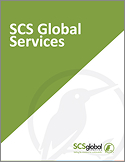Recycled Content Certification for Electrical and Electronic Equipment
Under Annex A of the SCS Recycled Content Standard

- Home /
- Services /
- Greener Product Claims /
- Recycled Content Certification for Electrical and Electronic Equipment

EBC Business Group
Demonstrate Leadership in the Use of Recycled Materials
This certification program raises the bar for recycled content claims related to a wide range of consumer electrical and electronic equipment (EEE). It supports brands and Original Equipment Manufacturers (OEMs) who are part of the circular economy, providing transparency around the total recycled content in their products. Eligible products include heating and portable A/C appliances, coffee machines, gaming devices, computer and internet equipment, mobile devices, and much more. Certificate holders can also use this certification to sell products through retailers such as Amazon under its Climate Pledge Friendly program.
Developed through a multi-stakeholder process, the EEE requirements are built into a comprehensive, sector-specific addition (Annex A) to the widely recognized SCS-103 Recycled Content Standard for consumer and business products, the recycled content standard of choice for industries across the economy. Third-party certification increases consumer confidence, satisfies customer specifications, and reinforces manufacturers' efforts to increase recycled material use. It also helps companies promote continuous improvement in the use of recycled materials, as well as innovation in material recycling processes to minimize waste to landfills.
SCS Expertise
SCS has been working with companies and stakeholders around the world for four decades to move the needle on sustainability. The rigor of SCS standards and expertise of SCS auditors helps protect brands, reduce risk, and ensure credible claims. We are dedicated to supporting clients on their sustainability journey and provide a range of solutions from independent analysis of product claims to corporate sustainability.
The Recycled Content Standard has played a key role since its introduction in 1989 in response to the burgeoning interest in recycled content claims and the development of innovative new recycling technologies. Since that time, SCS has certified thousands of products worldwide in a broad range of consumer and business product categories, building trust and transparency into this backbone of the circular economy. Today, the demand for recycled products and materials is stronger than ever.
- Eligibility
- Program Details
- Process
- FAQs
- Documents
Each eligible product sub-category (e.g., audio and speakers, home security system, PC/laptop accessories) includes multiple product types, as shown in the table below. Minimum recycled content baselines are established for each product. This baseline is updated from time to time to take into consideration regulatory standards that impact design, performance, and electrical safety. Because use of recycled material inputs is not the industry norm, the baseline encourages responsible material sourcing and continuous improvement.
To request the addition of a new product sub-category or product type, please visit the SCS Standards website.
| Product Sub-Category | Product Type | Examples of Commonly Used Virgin or Recycled Materials | Minimum Total % Recycled Content in the Product |
|---|---|---|---|
| Audio and Speakers | Portable Audio Products/Smart Speakers – uncorded | Steel, Plastics, Copper, Zinc | 30% |
| Speaker (e.g., Audio system, Sound bars) – corded | Steel, Plastics, Copper, Zinc | 15% | |
| TWS Earbuds – uncorded, includes charging case | Steel, Plastics, Copper, Zinc | 30% | |
| Electronic Accessories (Non-Wired/Non-Battery) | Case | Textile, Plastic, Metals | 35% |
| Casebook Cover | Textile, Plastic, Metals | 35% | |
| Sleeve | Textile, Plastic, Metals | 35% | |
| Stand | Plastic, Metals | 50% | |
| Fixed Computing (corded) | All-in-One Computing | Steel, Copper, Plastics, Aluminum, Zinc | 15% |
| Desktop PC | Steel, Copper, Plastics, Aluminum, Zinc | 15% | |
| Gaming | Gaming Console | Plastics | 10% |
| Gaming Controller | Plastics | 10% | |
| Gaming Device | Plastics | 10% | |
| Home Security Systems | Camera (e.g., indoor/outdoor camera, video doorbell); Accessories (e.g., base station, keypad, motion detector, range extender) | Plastics, Metals | 10% |
| Infrastructure Computing (corded) | Server | Steel, Aluminum (optional: Plastics) | 20% |
| Storage | Steel, Aluminum (optional: Plastics) | 20% | |
| Mobile Computing (uncorded) | Mobile Laptop/Laptop Notebook | Steel, Plastics, Aluminum, Magnesium, Carbon Fiber | 15% |
| Mobile Devices (uncorded) | Smartphone | Gold, Rare Earth, Tungsten, Tin, Aluminum, Plastics | 30% |
| Tablets (e.g., touch screen device with a built-in mount, e-reader) | Gold, Rare Earth, Tungsten, Tin, Aluminum, Plastics | 30% | |
| Wearables (e.g., smart watch, heart rate monitor) | Gold, Rare Earth, Tungsten, Tin, Aluminum, Plastics | 30% | |
| PC/Laptop Accessories | Headset | Plastics | 30% |
| Keyboard | Plastics | 50% | |
| Mouse | Plastics | 50% | |
| Power Supplies (e.g., chargers, power banks) | Plastics | 15% | |
| Webcam | Plastics | 15% | |
| Printers and Scanners | Printer (Inkjet/Laser) | Plastics, Metals | 25% |
| Scanner | Plastics, Metals | 25% | |
| Small Household Products/Appliances | Coffee Machine | Plastics, Aluminum, Steel, Copper | 15% |
| Dehumidifier | Plastics, Aluminum, Steel, Copper | 10% | |
| Heater | Plastics, Aluminum, Steel, Copper | 25% | |
| Portable A/C | Plastics, Aluminum, Steel, Copper | 5% | |
| Small Network Equipment (SNE) | Dongle | Plastics, Metals | 50% |
| Hub | Plastics, Metals | 50% | |
| Satellite Internet Antenna Unit | Plastics, Metals | 15% | |
| Smart Plug | Plastics, Metals | 15% | |
| Smart Switch/Breaker | Plastics, Metals | 15% | |
| Streaming Device (e.g., firestick, roku) | Plastics, Metals | 50% | |
| Wi-Fi Router | Plastics, Metals | 15% | |
| Visual (may include speakers) | PC Display/Monitor | Steel, Plastics, Copper, Zinc | 15% |
| Smart Display – corded (e.g., smart television, smart whiteboard, smart customer display) | Steel, Plastics, Copper, Zinc | 30% |
For each product type, the standard provides a minimum recycled material content threshold. This minimum threshold can be met with the use of either pre-consumer and post-consumer recycled material. In general, products must contain more than one recycled material input to be eligible. Exemptions may be granted for products on a case-by-case basis.
Conformance Options
Option 1: The product contains at least two recycled materials that meet the material-level thresholds, and the product meets the product-level thresholds.
Option 2: The product contains at least three recycled materials that meet the material-level thresholds. In this case, the product is not required to meet the product-level threshold.
Apply now if you’re ready to take the next step, or contact us to determine if your product qualifies.
The certification process involves an audit of legal compliance, supplier verification and validation, material due diligence procedures, minimum recycled content criteria, and material inputs.
Initial Audit
- Authorization. Client authorizes work to proceed.
- Data Submission. Client completes the SCS data request form (DRF) and provides supplementary documents. The auditor conducts a desk-audit review based on this information and provides feedback.
- Onsite Audit. The auditor conducts an onsite audit (or virtual audit if needed) on an agreed-upon date.
- Initial Findings. The auditor issues findings based on the audit. The client then has an opportunity to respond to these findings.
- Draft Report. The auditor drafts a report, taking into consideration the client’s responses to findings, with a certification recommendation.
- Internal Review. The auditor’s report is reviewed before a final certification decision is made.
- Certification. If the certification decision is positive, a certificate is issued, valid for one year.
Why should our products undergo certification?
Third-party certification builds business value, enabling companies to provide independent confirmation of their recycled content claims to business customers and consumers, satisfy market specifications, and reinforce a sustainable supply chain.
Why should our company seek out products that contain certified recycled content?
Certification creates needed transparency around recycled content claims, to ensure a level playing field in the marketplace. Your participation in the circular economy stimulates increased use of recycled materials in products, reinforcing innovation in material recycling processes to improve the functionality and performance of recycled materials, and reducing waste going to landfill or incineration.
Does this certification qualify my product for the Amazon Climate Friendly Pledge program?
Yes, certification under the SCS Recycled Content Standard V3.0, Annex A, is sufficient for recognition. Read more on our Climate Pledge Friendly page.
Are there minimum thresholds established for recycled content in my product?
Yes. Minimum percentage thresholds (i.e., baselines) are established by recycled material type. These baselines are updated from time to time to take into consideration regulatory standards that impact design, performance, and electrical safety. In addition, minimum thresholds are established for the finished product (see the Eligibility tab for details).
Minimum Recycled Material-Level Thresholds for Metals and Plastics
Metals % Plastics % Aluminum 30 Polyethylene 30 Cobalt 15 Polyethylene Teraphthalate 30 Copper 50 Polycarbonate 30 Gold* 70 Carbon Fiber 30 Magnesium 70 Polypropylene 30 Platinum* 50 ABS; PC/ABS 30 Rare Earths 15 Other (e.g. PA6, PA66, HIPS, SAN, POM, PBT, PETG) 25 Steel 20 Tin* 20 Titanium 50 Tungsten* 70 *Requires an implemented due diligence
and Know Your Counterparty Procedure
EBC Business Group
Service Brochure




